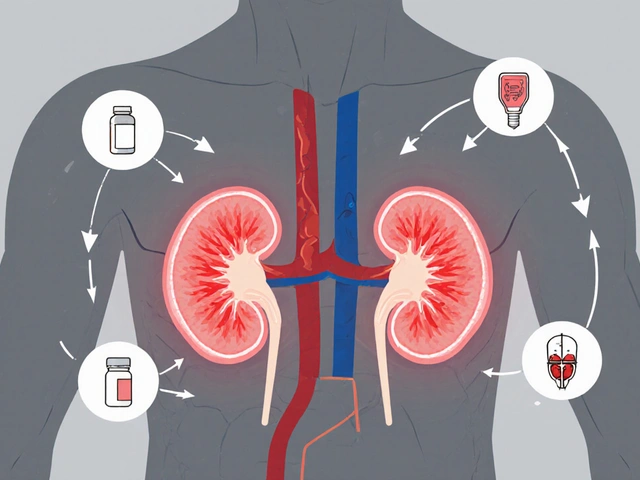Dealing with allergies can be a real drag, right? If you're one of those who rely on Loratadine to keep the sneezing and itching at bay, you might be interested in knowing what else is out there in 2025. You know, just in case you need a backup plan or something that suits you better.
Let's start with Desloratadine. It's a close cousin of Loratadine and is pretty neat because it's also non-drowsy. Give it a shot if you'd like something effective without the snooze button.
Next up is Fexofenadine, known for being a reliable contender in the non-drowsy antihistamine category. It's out there ready to tackle those bothersome allergy symptoms head-on.
Cetirizine is another familiar name. It's been around helping folks for years, but be warned: a nap might be in your future thanks to this one's potential drowsiness.
Then there's Levocetirizine. A bit more niche maybe, but if Cetirizine has been your go-to, this one might be a step up worth checking out.
Old but gold, Diphenhydramine is still a go-to for quick relief. Just don't plan on driving or operating heavy machinery after taking it, okay?
And for those with serious allergy woes, Xolair presents a different approach. It’s not your typical over-the-counter remedy but might just do the trick when others fall short.
Desloratadine
So, let's talk about Desloratadine. You might know it as Clarinex if you're picking it up from the pharmacy. It's actually the active metabolite of Loratadine, meaning it's like the next step in that medication family. It works by blocking histamines in your body, the guys responsible for making you sneeze, itch, and feel generally miserable during allergy season.
One of Desloratadine's standout features is that it's a non-drowsy alternative, similar to Loratadine. So you can take it without worrying about nodding off during a meeting or while driving. It's mainly used for treating hay fever and chronic skin reactions such as hives.
Pros
- Non-drowsy, keeping your head clear and focused.
- Effective in alleviating allergy symptoms like sneezing and itching.
- Available in tablet and syrup forms, catering to both adults and kids.
Cons
- Can be a bit pricier than generic Loratadine, which might be a consideration for budget-conscious folks.
- Possible side effects include mild drowsiness and gastrointestinal issues, though usually on the rare side.
In a nutshell, Desloratadine could be a top choice if you're looking for consistent allergy relief without the risk of falling asleep at the wheel. It's the choice for those who need to be in the game all day long, without interruptions.
Fexofenadine
If you're looking to switch it up from Loratadine, Fexofenadine—often known by the brand name Allegra—might just be your next go-to for tackling allergies. This one's a top pick in the world of non-drowsy antihistamines, making sure you stay clear-headed while battling those bothersome allergy symptoms.
Unlike some of its competitors, Fexofenadine boasts a solid track record of reducing symptoms without putting you under a sleepy spell. It's been around for years, serving as a trusty alternative for folks who can't afford to slow down.
How It Works
Fexofenadine works by blocking the histamine receptors in your body. When you're exposed to an allergen, the body releases histamine, which leads to pesky symptoms like sneezing, itching, and runny nose. By blocking these receptors, Fexofenadine effectively reduces the symptoms.
Pros
- Non-drowsy: You'll be able to work, drive, or study without fighting off drowsiness.
- Availability: Readily available over-the-counter in most pharmacies.
- Long-lasting: Typically effective with just one dose a day.
Cons
- Potential side effects: While it's generally well-tolerated, some people might experience headaches or dizziness.
- Cost: It could be pricier compared to generic options.
In 2025, it's still a reliable option if you're looking for allergy relief without the slow-motion feel. Give Fexofenadine a try and see if it fits your lifestyle better!
Cetirizine (Zyrtec)
Cetirizine, often recognized by its brand name Zyrtec, is a popular alternative when dealing with allergies, already known to many for its effective relief. It's part of the second-generation antihistamines, which mostly means it promises less drowsiness than the older options. Still, anyone who's taken Cetirizine knows it can be a bit of a double-edged sword—while it’s fast-acting, some find themselves battling a desire for a nap once the relief kicks in.
Cetirizine Pros
- Quick Relief: Many users report that Cetirizine gets to work within an hour. That's pretty fast if you're staring down the barrel of a pollen burst.
- Convenient Dosage: Typically, a once-a-day dose is all you need to stay covered.
- OTC Availability: No need for a prescription, making it easy to grab during a grocery run.
Cetirizine Cons
- Potential Drowsiness: Though non-drowsy by the books, it still sneaks up on some folks. Planning for it might be wise.
- Possible Weight Gain: Some reports point to increased appetite as a side effect. Something to digest, literally.
Doctors advice keeping an eye out for long-term use side effects, particularly if you’re relying on Cetirizine daily through allergy seasons. As always, if you notice any unusual symptoms, consulting your healthcare provider is the best route. For those who handle it well, it remains a reliable choice in managing persistent allergy symptoms.

Levocetirizine
Levocetirizine might sound like a mouthful, but it’s simply the active form of Cetirizine, better known as Zyrtec. If you're familiar with Cetirizine, then think of this as the newer, possibly smoother, operator in town. It's designed to be more effective with fewer side effects.
This antihistamine is part of the talk because it aims to provide long-lasting relief from annoying allergy symptoms like sneezing, runny nose, and itchy eyes, without knocking you out. If you’ve tried Cetirizine and found it a bit too sedative, Levocetirizine could be a promising alternative. Its job? Keeping you allergy-free while minimizing that need for a nap.
Pros
- Less sedating compared to its counterpart, Cetirizine.
- Effective in managing both indoor and outdoor allergy symptoms.
- Available over-the-counter in many places, making accessibility easier.
Cons
- Still possible drowsiness, especially in sensitive individuals.
- Side effects can include dry mouth and fatigue in some cases.
- May not be suitable for people with kidney issues without doctor’s advice.
One thing to remember is that everyone reacts differently to medications. While Levocetirizine promises less drowsiness, it’s not a guarantee for everyone. Some may still feel hints of tiredness, but it’s all about finding what works best for your body.
Diphenhydramine
Meet Diphenhydramine, the trusty old workhorse of allergy medications. Used for decades, it's a first-generation antihistamine that comes with a bit of a trade-off. If you're dealing with those nasty allergies, this might just give you the fast relief you're after, but plan to relax a bit after taking it.
How It Works
Diphenhydramine blocks histamines in your body, and by doing so, it eases symptoms like sneezing, runny nose, itching, and those dreaded red, watery eyes. But here's the thing: it tends to cross the blood-brain barrier, which means drowsiness is a common side effect. So, if you're planning on doing anything that requires your full attention, save this one for bedtime.
Pros
- Quick Relief: Known for its fast-acting properties, making it great for sudden allergy attacks.
- Widely Available: Over-the-counter access makes it super easy to get your hands on.
- Trusted Brand: With brands like Benadryl, you know you're in good hands.
Cons
- Drowsiness: This is a biggie—might make you sleepy, which can be inconvenient.
- Short Duration: Effects don't last as long as some newer options, so you may need frequent doses.
For many, its long-standing reputation makes it a go-to option at night or when staying in. Whether you're using it for allergies or an occasional bout of insomnia, Diphenhydramine has its place. But don't forget to weigh its pros and cons before picking it up.
Xolair
Let's talk about something a bit different from the usual pills and over-the-counter options—Xolair. Now, Xolair isn't your typical quick-grab allergy fix. It's an injectable medication primarily used for those who have more severe allergy or asthma problems, especially when other treatments haven't cut it.
What's special about Xolair is that it targets a specific antibody called IgE. If you've got high levels of this guy floating around, you're more likely to experience allergies. By reducing IgE, Xolair helps decrease your body's allergic responses. Pretty neat, right?
Pros
- Effective for severe asthma and allergies when other medications fail.
- Targets and reduces IgE levels, which are often elevated in allergy sufferers.
- Could reduce frequency and severity of asthma attacks.
Cons
- Requires regular injections by a healthcare professional, which isn't as convenient as popping a pill.
- Might be pricey compared to over-the-counter options like loratadine alternatives.
- Possibility of side effects, including injection site reactions, headaches, and in rare cases, more serious allergic reactions.
If you're considering Xolair, chatting with your doctor is crucial. They can help weigh the risks and benefits, making sure it's the right fit for your specific situation. Plus, since it's an injection, you'll need their help to get started anyway.
While Xolair is a bit more of a commitment than simply grabbing some allergy meds at the store, for those with severe allergies or asthma, it might just be the lifesaver they've been looking for.

Wrapping Up: Choosing the Right Allergy Relief
So, there you have it—six alternatives to keep in mind when you're looking for options beyond Loratadine. Whether you're after a non-drowsy solution like Desloratadine or Fexofenadine, or an over-the-counter staple like Diphenhydramine, you've got choices that cater to your unique needs and situations.
It's interesting how each of these medications brings something a little different to the table. Desloratadine and Fexofenadine shine for being non-drowsy, while Cetirizine might make you a bit sleepy but acts fast. If you’re leaning towards a more predictable and older option, Diphenhydramine might be your ally, just be prepared for its sedative effects. For those looking at more severe allergy relief, consider Xolair, but note it comes with a more complex regimen.
Here's a quick comparison to see how they stack up:
| Medication | Non-Drowsy | OTC Availability | Used For |
|---|---|---|---|
| Desloratadine | Yes | Yes | Allergies |
| Fexofenadine | Yes | Yes | Allergies |
| Cetirizine | No | Yes | Allergies |
| Levocetirizine | Somewhat | Yes | Allergies |
| Diphenhydramine | No | Yes | Allergies |
| Xolair | Yes | No | Severe Allergies |
Before making any switch, it’s always wise to have a chat with your healthcare provider. They can guide you based on your health history and allergy severity. Hopefully, now you feel a bit more informed and ready to tackle allergy season with confidence!








Patricia Mombourquette March 26, 2025
Loratadine alternatives are fine but you should stick with Americn made meds
karl lewis April 1, 2025
While the overview of alternatives is thorough, the phrasing could benefit from greater precision. One might consider a brief comparison of onset times versus half‑life durations. Such details aid clinicians in tailoring therapy to patient lifestyles. :)
Amy Martinez April 6, 2025
Reading through the list felt like strolling through a garden of possibilities, each flower offering its own fragrance. The non‑drowsy options sparkle like morning dew, keeping you alert for those Zoom calls. I appreciate the nod to older classics; they’re the reliable grandparents of allergy relief. If you’ve ever felt trapped by a sneeze, these choices might just be the key to freedom. Keep experimenting, and share what works for you!
Josh Grabenstein April 12, 2025
Sure the guide looks legit but who decides which meds get highlighted they might be hiding side effects in plain sight
Marilyn Decalo April 17, 2025
Oh dear, the drama of choosing an antihistamine! It’s like picking a costume for a masquerade where the mask could make you nap mid‑dance. Desloratadine boasts elegance, yet its price tag can sting like a bee. Fexofenadine, on the other hand, struts onto the stage with swagger and a slightly higher cost.
Mary Louise Leonardo April 23, 2025
Did you ever notice how the big pharma names keep popping up just when they release a new version? It's like they're scripting the sequel before the first one even ends!
Alex Bennett April 28, 2025
Choosing the right antihistamine in 2025 can feel like navigating a labyrinth with a dim flashlight. You’ve got Desloratadine promising the same efficacy with a fancier name, which is essentially Loratadine’s older sibling. Fexofenadine strides in, branding itself as the non‑drowsy champion, yet you’ll still find a few users clutching coffee to stay awake. Cetirizine, the tried‑and‑true workhorse, sometimes slips into nap‑mode when you least expect it, turning a meeting into a sleepy intermission. Levocetiridine attempts to outshine its predecessor by shedding a few side‑effects, but the difference can be as subtle as the flavor of a diet soda. Diphenhydramine, the granddaddy of antihistamines, remains the go‑to for rapid relief, though it carries the unmistakable side‑effect of turning you into a human pillow. Xolair, the injectable heavyweight, promises to tame severe asthma and allergies, yet you’ll need a doctor’s appointment and a deeper wallet. The price tags on these drugs vary like a rollercoaster, making budgeting a secondary headache. Some pharmacies stock generic versions that can save you a few bucks, while brand names charge premium rates for the same molecular action. It’s wise to check your insurance formulary before committing to a brand, because what looks cheap on the shelf may be costly after co‑pays. Remember that individual metabolism can turn a “non‑drowsy” label into a personal lullaby, so trial and error is often unavoidable. Side effects such as dry mouth, headaches, or mild GI upset can sneak up on you, regardless of the generation. If you have chronic hives or skin reactions, the syrup forms of Desloratadine might be more palatable for children. For those with kidney concerns, Levocetirizine dosage may need adjustment under medical supervision. And let’s not forget that lifestyle matters: a night‑shift worker might favor a truly non‑drowsy option over a cheap generic. In the end, the best antihistamine is the one that fits your schedule, budget, and tolerance without turning you into a walking advertisement for caffeine.
Mica Massenburg May 3, 2025
Interesting take but did you know the FDA data on antihistamines is filtered by the same labs that profit from Xolair? They don’t want you to see the full picture.
Sarah Brown May 9, 2025
Let’s be clear: you don’t need to gamble with every new drug on the market. Stick with proven non‑drowsy options if you value staying sharp, and consult a professional before trying something as intense as an injection.
Max Canning May 14, 2025
Yo fam, grab the non‑drowsy pills and crush those allergens! You’ve got this, power up!
Nick Rogers May 20, 2025
Indeed, the comparative table provides a succinct overview, highlighting key differences, such as drowsiness potential, OTC availability, and primary indications.
Tesia Hardy May 25, 2025
Great point! I love how you laid it out, super helpful, keep the info comin’ :)
Matt Quirie May 31, 2025
Thank you all for the engaging discussion; your insights contribute significantly to a comprehensive understanding of allergy management options.